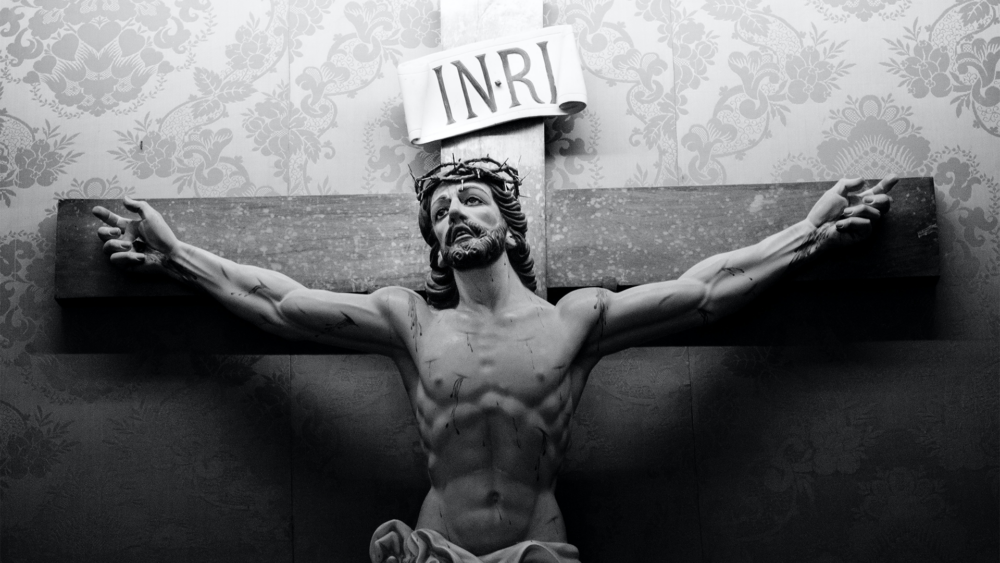“By virtue of His words, the bread – while keeping the external appearance of bread – becomes His Body, and the wine – while maintaining the external appearance of wine – becomes His Blood. This is the great mystery of faith! This is the Living Bread which came down from heaven!” — Pope St. John Paul II
The answer to the question: What is the Eucharist? Is actually very easy to say, but immensely difficult to understand. So, what is the Eucharist? It is the Body and Blood of our Lord Jesus Christ. It is not a metaphor; it is not merely remembering Christ’s sacrifice. As stated on the USCCB’s website, “The transformed bread and wine are truly the Body and Blood of Christ and are not merely symbols.”
The Eucharist is titled as such, because it is “an action of thanksgiving to God” as the Eucharist “makes present the one sacrifice of Christ the Savior.” (CCC, nos. 1328 and 1330.) And its explanation is clear from Christ’s own words in the Gospels (emphasis added):
Matthew 26:26-28
While they were eating, Jesus took bread, said the blessing, broke it, and giving it to his disciples said, “Take and eat; this is my body.”Then he took a cup, gave thanks, and gave it to them, saying, “Drink from it, all of you, l for this is my blood of the covenant, which will be shed on behalf of many for the forgiveness of sins.”
Mark 14: 22-24
While they were eating, he took bread, said the blessing, broke it, and gave it to them, and said, “Take it; this is my body.”Then he took a cup, gave thanks, and gave it to them, and they all drank from it. He said to them, “This is my blood of the covenant, which will be shed for many.”
Luke 22: 19-20
Then he took the bread, said the blessing, broke it, and gave it to them, saying, “This is my body, which will be given for you; do this in memory of me.”And likewise the cup after they had eaten, saying, “This cup is the new covenant in my blood, which will be shed for you.”
But, for me, the most compelling argument for the REAL PRESENCE can be found in John, Chapter 6, in the Bread of Life Discourse. Jesus is preaching to a group of people that were looking for him. Once they found him, Jesus talks about bread as a food, and how it gives life — making a comparison between the manna that fed the Israelites and the Eucharist, which will feed the world.
The people cry out: “Sir, give us this bread always.” (John 6: 34)
Jesus explains that He is the Bread of Life, and that His father sent him so that “everyone who sees the Son and believes in him may have eternal life, and I shall raise him on the last day.” (John 6: 40.) But the people begin to talk amongst themselves saying, “Is this not Jesus, the son of Joseph? Do we not know his father and mother? Then how can he say, ‘I have come down from heaven’?”
Jesus tells them to stop talking, and tells them the same thing again, but replaces “Son” with “me.” Jesus again reiterates that He is the Bread of Life. “I am the living bread that came down from heaven; whoever eats this bread will live forever; and the bread that I will give is my flesh for the life of the world.” (John 6: 51).
“How can He give us flesh to eat?” The crowd grows restless, and Christ doubles-down on His statement:
“Amen, amen, I say to you, unless you eat the flesh of the Son of Man and drink his blood, you do not have life within you. Whoever eats my flesh and drinks my blood has eternal life, and I will raise him on the last day. For my flesh is true food, and my blood is true drink. Whoever eats my flesh and drinks my blood remains in me and I in him. Just as the living Father sent me and I have life because of the Father, so also the one who feeds on me will have life because of me. This is the bread that came down from heaven. Unlike your ancestors who ate and still died, whoever eats this bread will live forever.” (John 6: 53-58)
And this is the kicker… the people begin to leave.
Jesus doesn’t try to stop them! He doesn’t say, “Hey, that was a metaphor! Don’t leave!” No, Jesus turns to the Apostles and says, “Do you also want to leave?” Wow. When Jesus said, “my flesh is true food, and my blood is true drink,” He meant it.
He left no other way to interpret it.

